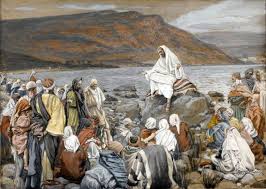Are you interested in a study on the Parable of the Sower (Matt. 13:3-9) or the Parable of the Laborers? In summary, the Kingdom Parables are about how one should live if they truly belong to God’s Kingdom. The purpose of the Parable of the Sower is responding to God’s Word in order to grow.

Parable of the Sower | Outline
The outline below is due to the late Dr. Ken Bailey.
3 Then He spoke many things to
them in parables, saying:
3 “Behold, a sower went out to sow.
4 And as he sowed,
4 some seed fell by the wayside; PLACE
and the birds came GROW (none)
and devoured it up. RESULT
5 Some fell on stony (rocky) places PLACE
where they did not have much earth (soil);
and they immediately sprang up GROW
because they had no depth of earth (no depth of soil)
6 But when the sun was up they were
scorched, and because they had no root
they withered away. RESULT
7 And some fell among thorns, PLACE
and the thorns sprang up GROW
and choked them (the plants). RESULT
and yielded a crop: GROW
some a hundredfold, some sixty, some thirty. RESULT
8 But others fell on good ground PLACE
9He who has ears to hear, let him hear!”
Parable of the Sower | God’s Kingdom
Before, we discuss the parable it is important to take into consideration the prior chapter in Matthew. Chapter twelve (please read it beforehand) deals with the lack of receptiveness or receptivity to Jesus. In Matthew 13:1 observe the words, “On the same day” (NKJV) or “That same day” (NIV). In other words, Matthew linked this parable teaching with the controversy or lack of reception in chapter 12.
The wonderful thing about God is He shares himself with humanity at all times no matter where one is at in life. There is something about Jesus that is so “attractive” and so “appealing”. Such marvelous love! Remember, Christ is the personification of God’s Word and God shares himself with both humanity and His Children in a variety of ways. Moreover, once again we should be encouraged that the Lord loves us and reaches out to us no matter where we are at.
But for the believer, life in God’s Kingdom entails a new reality born on an ongoing basis. In other words, we want to ever more be a people who are becoming more and more like Christ (Rom. 8:29).
To put it into the context of this parable; the goal of the gospel is the hearer (in this case, soil) hears the word (seed), and a new reality (plant) is born. -Dr. Ken Bailey.
Matthew, chapter 13 contains seven parables. Specifically, when taken together they describe the result of the presence of the Gospel in the world during the present age. As a side note, the bible speaks of this age and the age to come (Eph. 1:21). Additionally, let us keep in mind the gospel was not something that was conveyed and spoken out (like a message or sermon); it was something they “lived”. Please consider 1st Corinthians 4:20; God demonstrates His Word.
The first parable (Parable of the Sower) is an introduction to those that follow. Thus, it applies to both the believer and the unbeliever.
However, let’s look at the large picture. Indeed, the same sower and seed produced: 1) no crop, 2) some crop, or 3) much crop. But the sowing of the good seed of the kingdom began with our Lord’s ministry and no matter what… it will end with a crop or harvest (Matt. 13:8). God is faithful (2nd Tim. 2:13).
Parable of the Sower | Seeds by the Wayside
Are we responding and living for Christ? Let’s starting dissecting the parable.
verses 13:4,19:
What happens where people walk a path and seed has been laid down? When I was a kid, there was a pathway between our neighbors’ yard and ours. No grass grew since it was always walked on. But I remember my dad or mom trying to lay grass seed in the spot where it was dirt. Regardless of what was done, it never worked. Why? Simply, people kept walking on it. The ground was still hard and compact. The seed laid their compacted in the dirt. And from what I recall, the birds ate it. Thus, it produced nothing at all.
The difficulties of life and situations people face keep the ground (soil) of their heart hurt and hardened. The seed falls across their path in the form of both the message of God along with the love others share and demonstrate toward them, but the devil comes and snatches (steals) away what was sown in the heart.
Parable of the Sower | Seeds on Rocky Soil
verses 13:5-6,20-21:
The second type of soil stands for those whose initial response is… “Yes, love it… got it.” Some growth starts. These people begin well, but fail to continue to follow the Lord faithfully. “These people are disciples who begin well, but fail to continue to follow the Lord faithfully. Whether they are saved or lost is beside the point.” -Dr. Thomas Constable
When you and I do not nurture the soil, the soil remains shallow for the seed. Particularly, when the sun (heat and pressure of trials) arises, it can cause one to abandon both cultivating the seed (“the seed is the word of God”, Luke 8:11) and the soil (our hearts) where the word belongs. Actually, it does happen with some people. Straightaway, what grew quickly dies.
Roots are important. In this case, the roots could not penetrate the rock below. Consequently, in regards to Israel, the story is referring to limestone.
Parable of the Sower | Seeds Among Thorns
verses 13:7,22:
This person… the soil among thorns allows “the other” concerns of life to crowd out their commitment to Jesus. What happens is the competing concerns of life take precedence or priority over one’s spiritual development. “Me and now” is more important than tomorrow or the future. It is more important than God’s Word, loving others, loving our spouse well and spending time with our family. There are plenty of people that do things for themselves (even in the church) who are more wrapped into what benefits them rather than God and others.
As these things capture one’s affection… deception is already unfolding, because the other things have been draining the spiritual vitality (the truth of what they know is in God’s Word) before the person realizes what is happening to him or her.
This does not mean we cannot enjoy other things. No, God created various things for us to enjoy and it is “good”. In fact, God called it “good”. The issue, is do other things “continually” replace the priority? What has one’s affection? What is their appeal? And it is not only our relationship to God, but our spouse and children. All of these are a priority and should be our greatest attraction and affection. Thus, the thorn bushes robbed the young plants of light and nourishment, so they died too.
Parable of the Sower | Seeds on Good Soil
verses 13:8,23:
The “good soil” stands for the person who understands the message about the kingdom. And when he or she hears it, they respond appropriately. Specifically, it is ultimately about us always “responding to Jesus”: the way He loved, the way He lived, the way He communicated and the way He spent time with His Father and others. Such a person becomes spiritually productive.
But notice, the degree of growth varies. The sower is not interested in all growing at the same pace. He understands the varying degrees of growth, but “growing” is the key matter. Therefore, we too need to be filled with grace and not expect identical levels of fruitfulness in all people, since believers grow spiritually at different rates.
Fruit-bearing is an essential mark of the kingdom. The seed is not enough. The sower is not satisfied with a green field blossoming before him. His goal is to produce a crop (fruit). “By this My Father is glorified, that you bear much fruit; so you will be My disciples” (John 15:8).
Parable of the Sower | God of Action and Power
What do I love about this parable? Let’s phrase it in the form of a question and answer it. How do we know God seeks to reach out to us no matter where we are at?
Observe, the “actions” of the sower. God is a God of action and power. He is not static. He is involved and seeks to be involved in our lives. Indeed, the actions of the sower are important. He sows the seed everywhere (notice, the word “fell” mentioned in each soil) even in potentially unfruitful places. That is Grace. That is the God of the Holy Scriptures, who seeks to reach us where we are at. It cannot get any better.
Parable of the Sower | Further Thoughts
I want to add a bit more to this parable. Basically, in each soil where the seed fell, a few the questions arise. What “affection” has captured our heart or what “appeals” to our heart and has our focus or attention?
When Peter denied the Lord; John, chapter 21 decrees that Jesus reached out to Peter. It was not Peter who sought out the Lord. Again, notice the Lord is always reaching out to us similar to the sower sowing his seed everywhere.
After Jesus reaches out to Peter, the Lord is simply checking (reaffirming) things. Now, if you notice the Lord asks Peter something similar three times; similar to the denial 3 times.
The Lord asks Peter, “do you love me more than these?” (John 21:15). Using my own words, “Peter, am I your greatest affection? Am I your greatest appeal and focus?” Basically, Peter responds, “you know I love you”. However, consider what Jesus does not mention to him. He does not say, “tell me you are sorry or you did not mean to deny me.” As a side note, of course, repentance and forgiveness have their place. But rather (using my own paraphrase) we hear Jesus say, “okay, you love me and I’m your greatest affection, go and feed my sheep.” In other words, “you love me, live for me, and love the people the way I have.”
Parable of the Sower | Application
The message of Jesus and Christianity is simple. Hear, respond, and bear fruit. Live for me!
Parable of the Sower | Conclusion
How do you respond when you hear the Parable of the Sower? Is the soil (your heart) continually cultivated? The ever growing “new reality” should be unfolding as we respond and live for Him whether it is 30, 60, etc.

Trackbacks/Pingbacks